My cat died today, 18 and a half years old — almost 18 years to the day since we got her. I moved out at 23, when my kid sister was 12, so in many senses I was closer to that cat than my own sister (certainly in terms of time spent within a few feet of each other). Forgive me if I’m a bit of a mess for the next few days.
I’ve often said she’s the best, most amazing cat in the world — you all think that of your cats but you’re wrong because it was my cat (well, now one of you might be right). However, it’s always been hard to explain why she was the best cat, so I suppose I will just throw pictures and mini-stories at you (keep scrolling), and otherwise just remind myself that I don’t need to convince anyone else that she was not just awesome and sweet and loving but the best cat ever.
What’s really amazed me the past few years is how good she is with Blueberry (and vice-versa).
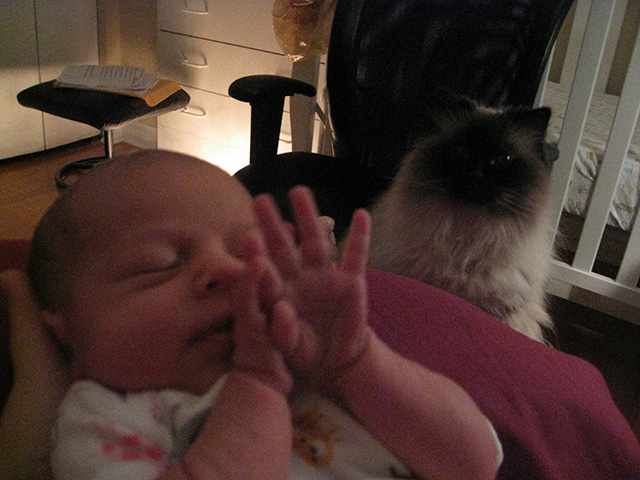
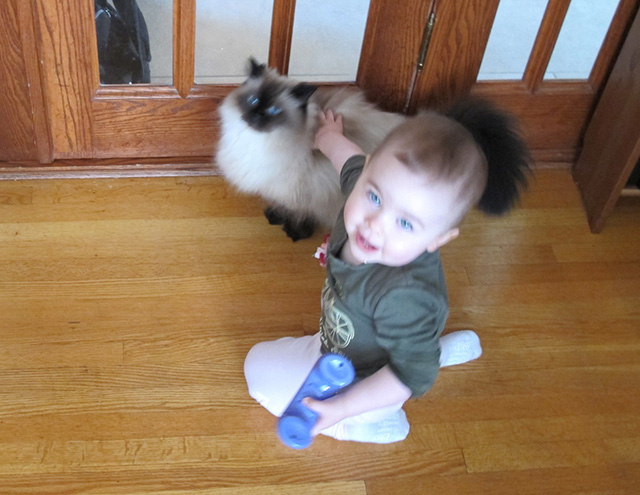
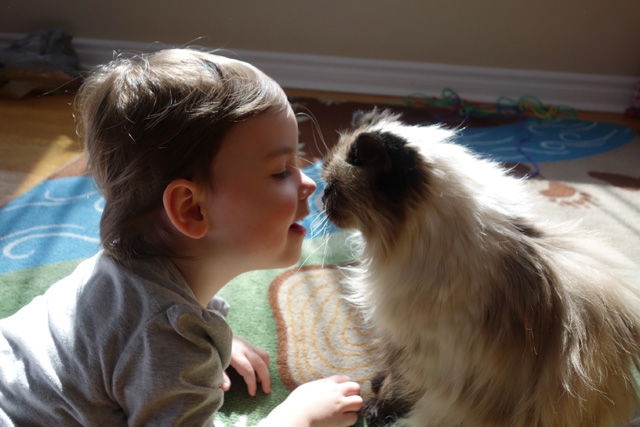
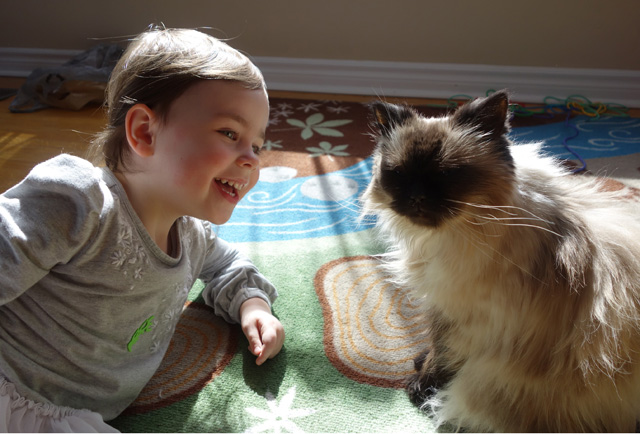
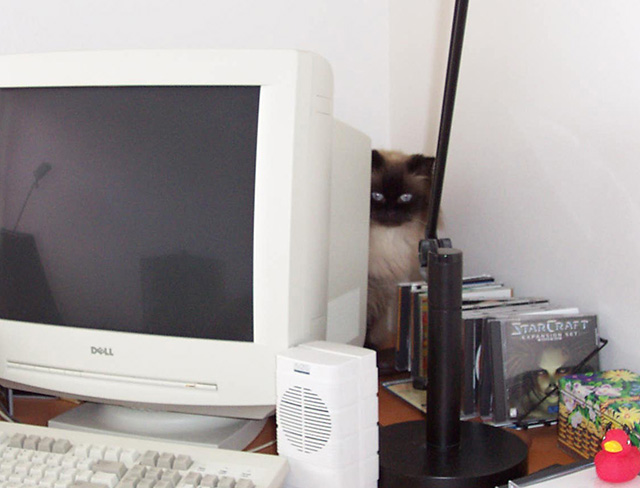
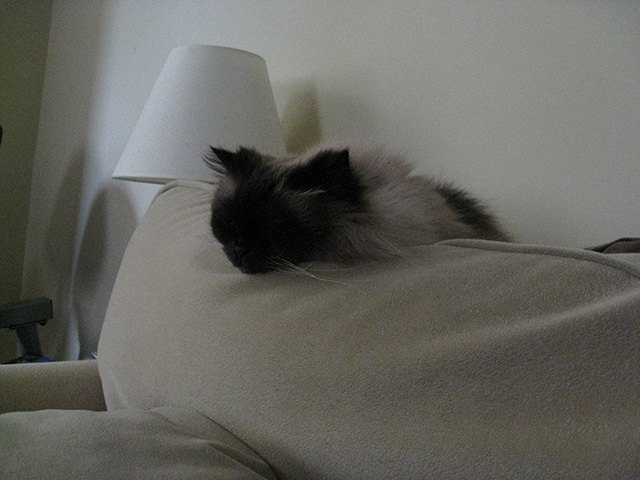
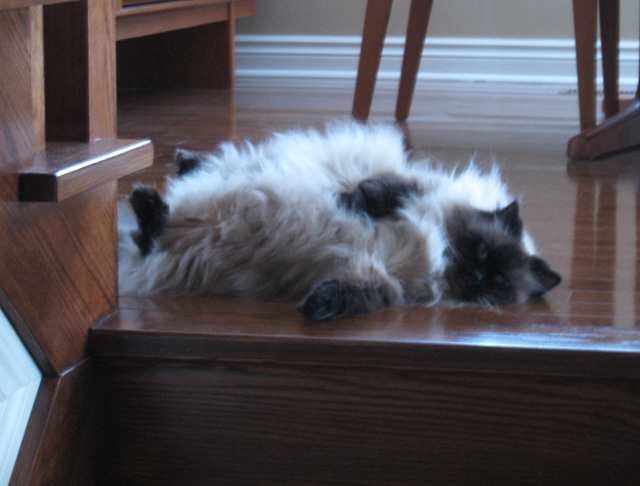
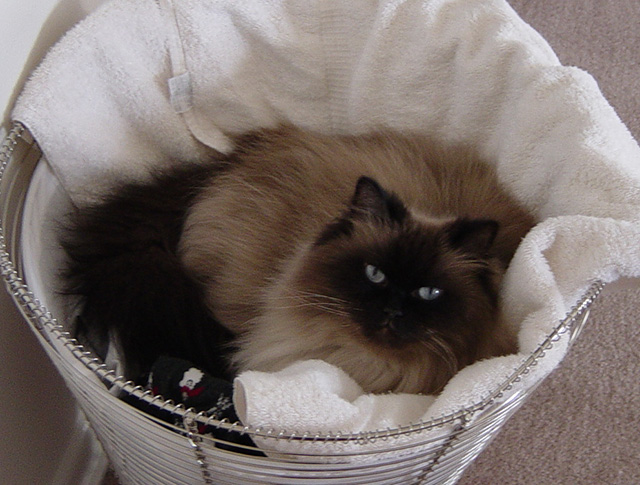
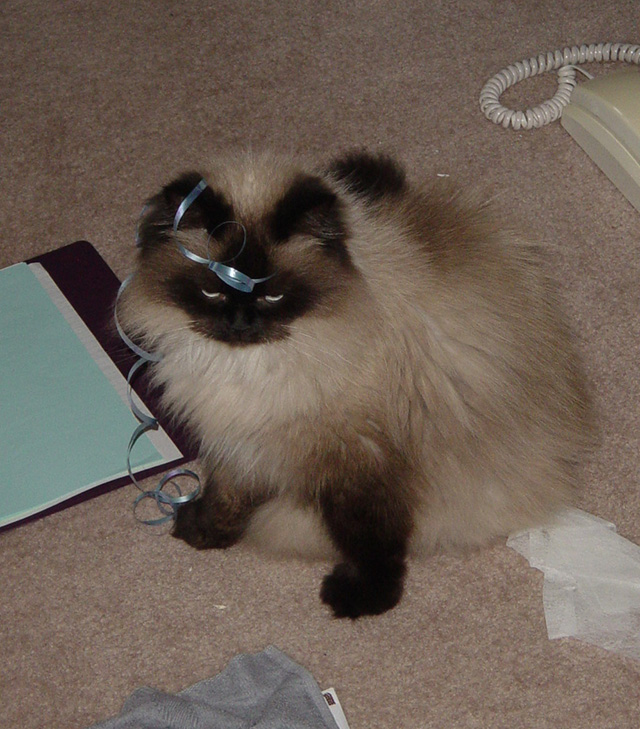
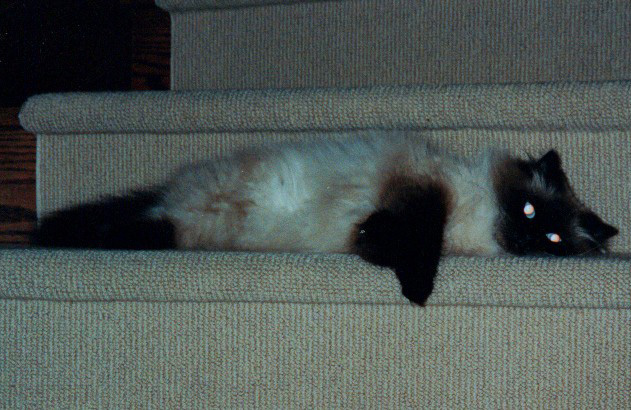
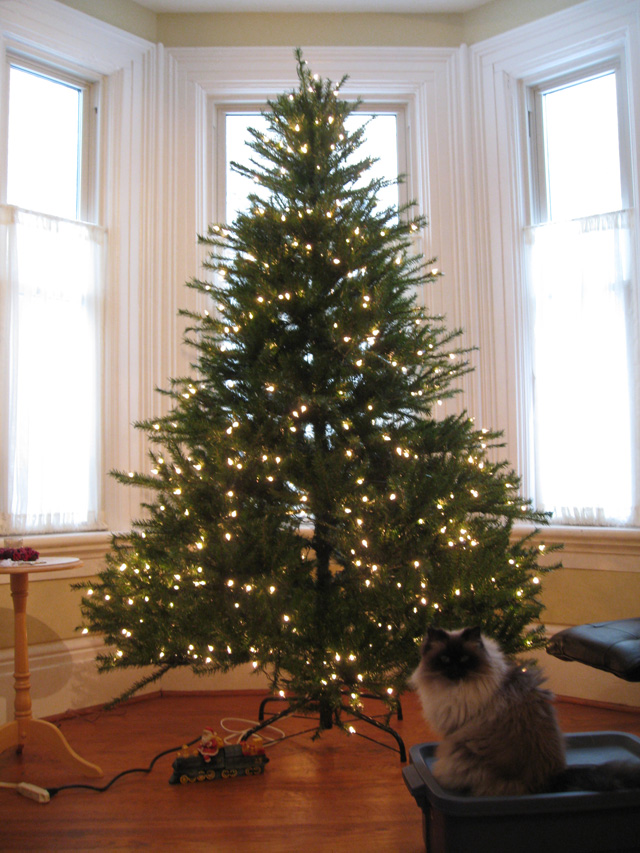
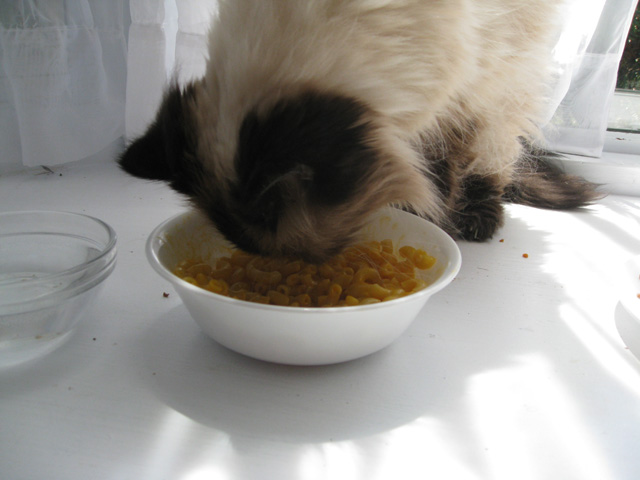
The Origin Story
We got her years ago, on PEI. At the time I didn’t want to get a cat because I had had dogs until shortly before my sister was born, and my dad promised I could get a dog as soon as he stopped smoking (aside: he would not quit for ~7 more years, when he went cold turkey after a cancer diagnosis). I never saw her at the combination vet clinic/pet store where they got her, but supposedly she was super-friendly with all the people coming in to the store, and was nearly 5 months old (she roamed the store, she wasn’t in a cage). There wasn’t much of a market for pure-bred Himalayan cats on the Island, so the store owner said she was going to adopt her herself if no one got her by 6 mo. My mom and sister fell in love and raced back to the cottage to try to convince the rest of us that we needed a cat. My dad had a conference call, and my sister kept trying to ask him to get the cat. He kicked my mom and sister out of the cottage for making too much noise while he was on the call. My sister made pleading faces and hands at him through the window. Still on the conference call, he scrawled across a piece of paper “FUCK OFF, get the cat.” And so they hopped in the van and went right back to adopt her.
Taking her from the pet shop to our place seemed to break her brain: she couldn’t handle more than two people in a room and was constantly under a bed or the couch. I liked to stay up late into the night reading (some things never change), so I was often the only person up when the nocturnal cat came out to explore. We became best buddies. She immediately started sleeping under my bed, hiding from the others during the day, then snuggling with me in the recliner at night while I read. It took a few weeks, but soon enough she was sleeping on top of the bed with me.
Back in Toronto she started sleeping not just on my bed, but up on my pillow. She used to lick and groom the top of my head before we’d go to sleep. As my hair started falling out she seemed to have a realization that it was not a thing to do any more (I like to humanize it by thinking she mistakenly blamed herself for the hair loss), and instead slept beside me for bit, until a few bad nights of getting nearly rolled on and twitched out of place drove her to the foot of the bed. She also loved the basement. It was full of boxes and dust and places to hide, and being a teenager and the oldest child, I had claimed the basement as my own lair, so once again we became the two souls out on our own, and I started to think of her not as the cat that my mom and sister brought home on an impulse, but as my cat.
—
Driving
She hated driving. Supposedly she yowled the whole way back from the pet store in the first place. When our month-long vacation on PEI was over, we had to get back to Toronto in the van, and she yowled until about Moncton before settling back with me on the very back row of seats in the van.
When I moved to London, which was about a 2-hour drive away, she would cry for about the first hour and a half of the trip. Every time. The first time I took her out with me it was a terrible snowstorm, and I think it took nearly four hours to do the drive. On that one I swear she figured out how to modify her meows to call to me (and later Wayfare) by name. “Meeep, meeep, meeeowww, jeeeeow, jeeooon, jeeeooon, jeeeooon… [Way-fr; way-fr]…” After I stopped taking her back and forth every weekend she seemed to settle down about driving (a bit).
Even after she stopped crying the entire trip, we’d still get subjected to the protest pee when we tried to drive with her, where she’d pee in her travel crate as soon as it was placed in the car. We got that treatment on her very last long-distance trip, our return drive from the cottage two weeks ago.
—
Kitty and Blueberry
One thing that never ceased to amaze me is how this shy, skittish cat became fast friends with a toddler. I know Blueberry is awesome and very good and gentle with the cat, but she’s still a toddler and kind of unpredictable. Blueberry would “read” bedtime stories to the kitty while she napped on the couch, and was constantly bringing her toys and interesting things to sniff. Kitty would follow Blueberry around for a surprisingly large part of the day (given how much elderly cats sleep), and often came in to sit and listen to me read bedtime stories to Blueberry. They’d “ooga-mooga” (rub noses) together, and roll on the floor in the sunbeams together. Blueberry was excellent at giving kitty just one or two treats, and kitty was always super-excited to hear her politely ask “Daddy, can I give the kitty a treat please?” and start crinkling the bag.
—
Fluffball
She was super, super fluffy (Himalayan). But underneath all that fur she was always a small, dainty cat. She was a grazer who always left lots behind in her food bowl, just naturally skinny. All that fur was constantly flying off, and for a long time my wardrobe tended towards grey to hide the omnipresent cat hair.
Wayfare is incredibly allergic to cats, but had almost no problems with my kitty as long as she didn’t take a nap on Wayfare’s face. Many other people I’ve known with allergies didn’t even know I had a cat until they saw her, because their allergies weren’t triggered. I never thought I had cat allergies, but now I wonder if that’s just because of how awesome she was, as I find I get itchy eyes every now and then when I go visit my sister’s cat. It’s too soon to seriously consider whether we will get another cat, but I wonder if Wayfare’s allergies (and possibly Blueberry’s allergies, who also reacts to my sister’s cat but never to my kitty, even when smooshing her face into her side) will preclude us from getting another in the future.
Fur like that needs brushing, and for many years she would willingly come up on my lap and let me brush her. Normally she wasn’t allowed on my desk, but I’d let her up if she let me brush her for a bit. Starting a year or two before Blueberry was born, we were having more and more trouble getting her to accept regular brushing — she’d bite at the brush, or stop coming up on my lap entirely. So we got into a regular habit of cutting out big knots of hair as it bunched up instead. As she got older and less flexible, we had to really thin out the hair on her back near her tail because she couldn’t keep up with her grooming, and wouldn’t let us brush her. The past few months she wasn’t brushed at all: with the weight loss and dehydration we were just too afraid of hurting her or stressing her out, so she was just a big ball of mats across her sides and tummy — though miraculously the fur on top was still pristine and gorgeous (even the vet commented on it).
—
Goodbye My Dear Friend
I stayed home from work and spent the day with her today, doing a bit of work on the laptop in the living room while she snoozed in a sunbeam from the front window. I’d pet her, and cry, and she’d purr for a few seconds and go back to sleep. At lunch I had mac ‘n cheese, and she woke up to lick some cheese sauce off my noodles, just like old times. I tried offering her food and treats, and while she took 3 treats she only touched food twice, and even then only got a few teaspoons in.
A half hour before it was time to go to the vet she woke up, had a bowel movement, and visited her food bowl. Just like a cat to make the decision hard on you at the last minute. I figured if she was indeed doing a bit better with a few more good days in her, the vet visit could just be a chance for some more subcutaneous fluids and a checkup. We started the vet visit with a health check to kind of assess where we were at in terms of quality of life remaining and make sure that this was a helpful move. She was down to 3.5 lbs, her kidneys had atrophied, she was anemic, and above all, she just lay down on the examination table and didn’t try to get away. I offered her more treats and she wouldn’t lift her head up to take them. Those last two were the deciding factors for me. She died peacefully while I pet her.
The house feels so empty. Which is weird, because I’m up working on my computer, and for the past few weeks she would have been down on the windowsill at the opposite end of the house, not able to manage the stairs to come up here and visit me. There’s no way I could hear or otherwise sense her from here if she were here, but somehow I can just feel the emptiness (the rest of the family left for the weekend in part so Blueberry wouldn’t have to deal with kitty’s death and daddy being a mess). In some ways I’ve slid into the loss gradually — for instance, she used to always steal the footrest under my desk for a bed, but her limited mobility has meant that she hasn’t been there for weeks, so checking before I put my feet up was already a thing I was getting over. I’m not sure I’ll be eating mac ‘n cheese or laying in the sun in the living room for quite a while though.
She was a loving, gentle cat, and she was loved by all who knew her. I miss her terribly.














 Questrade: use QPass 356624159378948
Questrade: use QPass 356624159378948 Passiv is a tool that can connect to your Questrade account and make it easier to track and rebalance your portfolio, including the ability to make one-click trades.
Passiv is a tool that can connect to your Questrade account and make it easier to track and rebalance your portfolio, including the ability to make one-click trades.